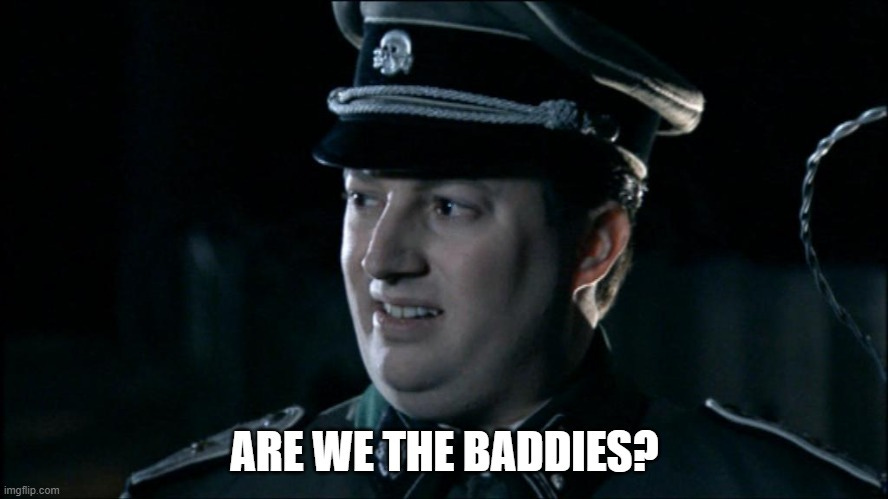
“Please have patience,” read the email from the Schulamt. “We will assign your son a spot in a class as soon as one is available and you will be properly informed by mail.”1
I had thought I was being patient.
My son, then 12, had been on a waiting list for a school place for four months. Mindful of Germany’s strict compulsory school attendance laws, I had registered him in our district soon after we arrived, acknowledging that he would need to be in a Wilkommenklasse to learn German, at first.
I had received an confirmation of the application, but nothing else, so after 60 days, I emailed a different school district office (the office phone rang unanswered) to inquire further.
This prompted the reply above from my application’s original recipient.
“The classes are all over-crowded,” she wrote by way of explanation, adding pointedly: “Too many immigrants moved here last year.”
I think about this interaction often.
Usually when hearing about yet another half-baked government plan to attract more highly skilled workers. Or, conversely, when people tell me there is no real labor shortage, just greedy employers who don’t want to pay Germans a living wage.
(The numbers don’t bear this out, by the way, but more on that later.)
This was my first indication that perhaps not all Germans were on board with the government’s plan to combat declining birth rates and a worsening labor shortage with immigration.
Are we the bad guys?
‘Down Yuppies! Gentrifiers out!” the English graffiti appeared overnight at the top of the apartment building facing our window.
Our apartment building is one of a group of ‘neubau’ (new builds) constructed on the site of a former factory that had been empty since the ‘90s. Many of the tenants are immigrants like us, or Germans able to pay the higher rents for apartments that aren’t subject to the Berlin Mietpreisbremse (rental brake).
We didn’t set out to be gentrifiers.
We rented the first apartment that we could afford and would accept us. Lacking an old rental contract or the local social networks to find one—we took what we could get. The same is true of our neighbors, many of whom moved from other German cities to take jobs in the capital.
It was also not our intention to add to the burden of Berlin’s overwhelmed secondary education system.
Viewed from a distance, as we considered a job offer from a Germany company while still at home in the States, we thought our move would be a win-win. We would get a footing in a stable European economy, contributing needed skills and tax revenue, and bringing two teenage kids who soon finish school and be able to do the same.
No one mentioned the housing shortage, the teacher shortage, or the long waits at the understaffed Auslanderbehörde.
Labor shortage? It’s complicated
For all the headlines devoted to Germany’s skilled worker shortage, it might be surprising to find out that there are roughly equal number of working-age unemployed adults and open, unfilled jobs.
According to the German Federal Statistical Office, there are an estimated 1.7 million unemployed adults and just under 1 million open positions. But business leaders say the true number of vacancies at closer to 2 million, since some companies have stopped reporting all vacancies.
Opponents of increased immigration often claim that companies want to take the easy way out and recruit foreign workers, often for lower pay, instead of investing in the costs to recruit and retrain Germans.
Business leaders say its not that simple.
You can’t just take an unemployed former coal miner from the Rhine-Ruhr region and plug him into an opening for a mechanical engineer in Bavaria, for example. There are large regional disparities in employment and educational levels, as well as corporate investment, that make large-scale re-training impractical in the near future.
Further complicating the picture: Germany’s aging demographics.
Since 1972, more Germans have died each year than were born, meaning that its population is not replacing itself. Even if all currently unemployed adults were to find work in the German labor market, there will still be a need for workers from abroad.
A huge number of Baby Boom-era workers are set to retire in the next few decades, which will mean huge labor gaps if something isn’t done.

May the odds be ever in your favor!
It doesn’t help that Germany’s leaders often propose simplistic solutions to complex problems—and the country’s decentralized bureaucracy lets them delegate the messy details.
In 2015, then-Chancellor Angela Merkel famously made the decision to allow almost 1 million Syrian refugees to seek asylum in Germany. But it was up to local officials to figure out how to feed, house, and integrate the newcomers, without much guidance or support from above.
It was much the same with the Russian invasion of Ukraine in 2022. Tens of thousands of refugees—who did not speak German—ended up in cities and towns that were already overwhelmed, wanting a place to live, schools for their children—and jobs.
Germany needs workers, right?
But asylum seekers are not always allowed to seek employment, and the rules for who can take what jobs are complicated.
Now add in people like us—with valid jobs and work visas. And, we also want—you guessed it—a place to live, schools, doctors, and child care for their families.
I don’t blame the overwhelmed local immigration authorities, or the school districts, or the teachers and administrators who are frustrated and often point the blame at the people right in front of them.
“If it’s so bad, why don’t you go back where you came from?”
Is it all a shell game?
I mean, it’s not an insurmountable problem. If there were a well-developed plan in place that sought input from all stakeholders to think through these issues ahead of time, that would be one thing.
Maybe part of the multi-billion stimulus package could include money for education, job retraining, language classes for immigrants, more staffing for the agencies tasked with issuing visas, residents permits and vetting citizenship applications?
Or, not.
It often feels like policy makers prefer to see the country’s population—native and not— as a series of numbers in graphs and spreadsheets, but not as human beings.
Take a little from columns A and B and shift to column C, and then wrap it up and put it all on someone else’s desk to figure out.
My favorite example would be the housing minister Klara Geywitz’ proposal to address the affordable housing crisis by telling people they should just “move to the countryside.”
Even as she announced her ‘plan',’ she acknowledged that many rural areas lacked the technology or transportation infrastructure to support long commutes or remote work. Also, no word on whether there would be sufficient child care facilities, doctors’ offices, or schools in “the countryside.”
She promised a three-point plan to address all of these issues by the end of the year—last year.
(We’re still waiting …)
You have to wonder if—to certain people—this is all a feature and not a bug.
Last week, a writer in The Guardian, accused German Chancellor Friedrich Merz of wanting, essentially, guest workers and not immigrants:
Friedrich Merz’s government has sent a clear message to anyone thinking about coming to live in Germany: don’t. Yet its message to those who want to come to Germany to work is: we need you.
This might sound like a contradiction, but it is a revival of the thinking that drove the “guest worker” programme of the postwar boom years. Between 1955 and 1973, West Germany sought to rebuild its economy by attracting labour, mainly from Turkey but also from Italy, Portugal and Yugoslavia. Yet it did so without giving much consideration to the human needs of the people coming.
What if Germany just churns through wave after wave of immigrant workers—recruiting people into sort of a slow-motion Hunger Games?
Worker A takes a job or accepts a place at university, but he can’t find an affordable apartment. So he rents an over-priced, poorly maintained room in a crowded WG. Maybe he accepts a dodgy sublet. He can’t complain or ask the landlord for repairs, because then he might get evicted. He needs a place to live to keep his visa.
Also, Immigrant Worker B isn’t going to refuse to work unpaid, illegal overtime or report anyone to the authorities. She has to keep that job to keep her visa.
If they keep all the balls in their air long enough, they win and can apply for permanent residency or citizenship, which gives them more legal protections.
But, if their individual houses of cards collapse, they lose and return to their home country. And another hopeful contestant moves in to take their place.
Meanwhile, the German government gets the pension contributions and tax money. Companies get workers so they can make a profit.
The landlords make money. German private schools and colleges—duly licensed by the government, by the way—make money. Lawyers, relocation agencies, translators, they get a piece, too.
This is the reason, you guys, that 1 in 4 immigrants here say they want to leave.

So, why don’t we leave?
We’re not leaving because we are needed here.
We can contribute to the majority who wants to keep Germany a prosperous, safe, and stable democracy.
Because the issues faced by workers and the middle classes in Germany differ only in degree from the problems currently ravaging the United States and other developed countries.
The leadership of large conglomerates are trying force people who labor for a living into a kind of neo-feudal serfdom—fewer and fewer rights, lower and lower wages, more and more privatization of former public goods.
And shortsighted leadership will let them, if they can, because it’s easier or because they hope to profit, too.
I wrote about this, before. But there’s a reason that Elon Musk and JD Vance support the far-right party in Germany. And it’s not because they believe in “Germany for Germans.”
They want a Germany that doesn’t require Tesla and Amazon to abide by its stricter labor laws or one won’t make Facebook and X adhere to the Digital Services Act.
If Germany ‘re-migrated’ everyone not born here, tomorrow, it wouldn’t be able to function. Think how many bus drivers, healthcare workers, sanitation workers, factory workers—yes, even civil service workers— wouldn’t be here.
Do you think German employers would suddenly just “pay Germans more” to do all of the above? And, if so, which Germans? Do you really know legions of native-born single, young people just out there adrift waiting to take these jobs on—if only for the right salary?
Or, maybe they tell retired people they need to just work longer, cut the benefits paid to parents, the unemployed or the poor?
It’s an old song that’s periodically updated with a new tune—immigrants are the scapegoat for problems created by greed and unchecked self-interest.
The truth is, there can be a future for everyone in Germany. For immigrants who want to integrate and settle here and people who have been left behind by short-sighted policies.
But we need to stop fighting and fearing each other and fight the real problem.
To state what is, hopefully, obvious—but in case it is not—the correspondence was conducted in German. I write in English, so in the interest of brevity, it is translated here.




Sounds like the same situation here in the USA. If you force these people to leave who will do the necessary work they do, and everything will shut down.
Also „simplistic solutions to complex problems” also have a virtue of fitting into a slogan or talking point and thus gain traction.